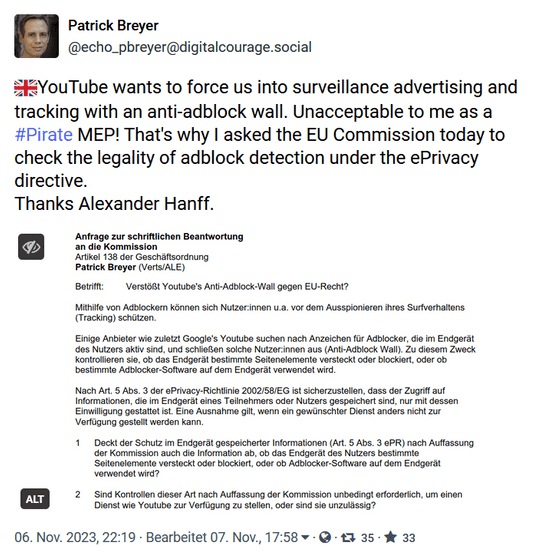Why is YouTube's anti-ad blocker claimed to be a ``violation of privacy rules''?

Several privacy activists and politicians have voiced their opinion that YouTube's regulation of ad blockers, which began in earnest around October 2023, is a privacy violation. The Verge, an IT news site, has summarized the basis for the claim that YouTube's 'anti-ad blocker' violates the EU's
YouTube's ad blocking crackdown is facing a new challenge: privacy laws - The Verge
https://www.theverge.com/2023/11/7/23950513/youtube-ad-blocker-crackdown-privacy-advocates-eu
The battle between ads and ad blockers is nothing new, but YouTube's launch of a 'global effort' to thwart ad blockers in 2023 has reignited interest in the topic.
According to a report from overseas media Wired, Internet users are installing and uninstalling ad blockers at a record pace in order to find ad blockers that are not affected by YouTube's regulations. On the other hand, YouTube claims that ``ad blockers violate YouTube's Terms of Service and prevent creators from earning advertising revenue.''
Some experts have begun taking concrete actions in response to YouTube's anti-ad blocker movement. In October 2023, privacy activist Alexander Hanff claimed that YouTube's ad blocker detection script operates without user consent, violating the EU's ePrivacy Directive. We have lodged a complaint with the Irish Data Protection Authority.
Activists claim that YouTube's ad blocker detection script operates without user consent and violates EU directives - GIGAZINE

YouTube now detects ad blockers through JavaScript that checks what is displayed on the page, or by determining whether an element necessary for an ad to load is blocked.
Regarding this, Hanff told The Verge: 'The AdBlock detection script can only be described as spyware, and deploying it without consent is unacceptable. 'We believe that the use of technologies that allow us to do so is unethical and illegal in most circumstances.'
In fact, this isn't the first time Hanff has complained to authorities about anti-ad blockers. Hanff also complained to the European Commission in 2016 about technology to detect ad blockers.
The ePrivacy Directive is known as the 'Cookie Law' because it specifies, among other things, that users should be asked for their consent when accessing cookies.
In response to Hanff's complaint, the European Commission stated that ``Article 5(3) of the ePrivacy Directive, which prohibits access to user data without clear explanation, does not apply to detecting whether a user has installed an ad blocker.'' 'It also applies to scripts that use cookies,' and expressed the view that not only cookies but also ad blocker regulations are subject to the ePrivacy Directive.

However, what happened after that was not as expected. The European Commission subsequently strengthened its position in its 2017 amendment to the Personal Information Protection Act, stating that ``website providers should be able to check whether users are using ad blockers without their consent.'' I'm turning it around.
Hanff believes that ``ad blocker detection scripts violate fundamental human rights as set out in the ePrivacy Directive, as well as other articles such as the Universal Declaration of Human Rights,'' and the Irish Data Protection Commission (DPC) He told The Verge that he agrees with that. However, DPC did not respond to The Verge's request for comment.
Hanff is not alone in opposing YouTube's ad blocker regulations. Patrick Breyer, a digital rights activist and member of the European Parliament who belongs to the German Pirate Party,

In response to these comments, YouTube spokesperson Christopher Lawton reiterated his response to an earlier inquiry from The Verge, saying, 'YouTube has launched a 'global effort' to regulate ad blockers.' said. Lawton added, 'Of course, we will fully cooperate with any inquiries from the DPC.'
At the time of writing, the EU authorities' stance on regulating YouTube's ad blockers is unclear, but Hanf is not taking a step back. 'If YouTube continues to say it's OK to put spyware on our devices, I'm going to take them down,' Hanff said.
Related Posts:
in Software, Posted by log1l_ks





